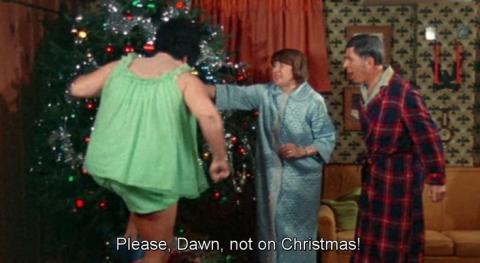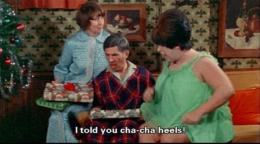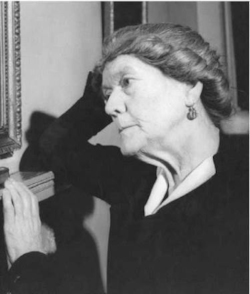'Please Dawn, not on Christmas' - The Christmas family argument – mediation, litigation or artistic inspiration?

A brief internet search of ‘Christmas’ the other day brought me inevitably to the topic of family arguments and with a bit more scrolling, to the large number of legal firms, family lawyers and solicitors offering advice on how to avoid these conflicts as they gear up for January, their busiest time of year.
According to the national law firm Stephensons, ‘thousands of people will spend the festive season secretly plotting to cut relatives out of their Will, after arguments over everything from Brexit to board games. Rather than bringing glad tidings, this Christmas will push many fragile family relationships to breaking point, with thousands choosing to amend their Will to disinherit their relatives.’ (1)
Nothing revelatory about this ‘new study’ and of course, upsetting for those involved but for me it immediately conjured up two of my favourite Christmas related artworks, firstly, film director John Waters and his 1974 film ‘Female Trouble’ and secondly the author Ivy Compton-Burnett who used the festive family argument to great effect in the opening chapters to her 1935 novel ‘A House and its Head’.
No one who has seen Female Trouble could forget the opening scenes where Divine as Dawn Davenport stomps all over the presents in her fluffy slippers and throws the Christmas tree onto her mother, crushing her underneath it because she gets ‘sensible shoes’ instead of the cha-cha heels she demanded ('nice girls don’t wear cha-cha heels').

John Waters famously loves Christmas, or at least the kitsch, bad taste aspects of it and wrote a hilarious essay ‘Why I love Christmas’ in his 1983 essay collection ‘Crackpot’. This essay introduced me amongst other things to some alternative Christmas classic movies, the 1980 slasher ‘Christmas Evil’ ('He’ll Sleigh You') being the best one. It was obscure and unavailable back in 1986 when I bought the book but can now be easily tracked down as a Blu-ray or online stream.
It was another John Waters recommendation, this time in his 2010 book ‘Role Models’ that brought the British author Ivy Compton Burnett to my attention. Her novel ‘A House and its Head’ also opens with a family argument and a tense visit to church on Christmas morning in 1885.

It begins with wife Ellen and husband Edgar bickering over why the children (two teenage daughters and nephew rather) have not yet come down for their presents, Ellen repeating the same line ‘So the children are not down yet?’ in four slightly different ways to the silence and general indifference of her husband. ‘Perhaps the mornings are getting dark?’ says Ellen. ‘Do you mean they are so sunk in lethargy and self-indulgence that they need a strong light to force them to raise their heads from their pillows?’ barks Edgar.
Finally, daughter Nance appears, ‘Well Nance, have you condescended to join us?’
‘If that is the word you would use father, I felt simply that I was joining you.’
‘Have you seen anything of Grant and Sibyl this morning?
‘No father, it is not a time of day when family intercourse flourishes.’
‘Grant, why were you late this morning?’
‘I felt a disinclination to rise, so strong that it overcame me.’ (2)
And so, the back-and-forth barbs continue until Grant’s present (a book he has asked his aunt to buy him that is unnamed but is thought to be ‘Origin of the Species’ by Charles Darwin) is thrown into the fire by his disapproving uncle. The rest of the morning and the visit to church continue in a similar ‘snipey’ vein (as does the rest of the novel).
It is hard for biographers and critics not to link this opening to a Christmas tragedy in Ivy’s early life when her two youngest sisters, Stephanie Primrose (“Baby”) and Catharine (Topsy) died in a suicide pact by taking veronal in their locked bedroom on Christmas Day, 1917. Ivy later attributed this to ‘too much music in their lives, I think it was all that music’ (3), although continuing to read through Ivy’s biographies reveals that her misanthropic, severe and singular view of the world touched on every aspect of life rather than just Christmas in particular.
“Anyone who picks up a Compton-Burnett finds it very hard not to put it down.” Compton-Burnett said of the twenty short but incredibly dense, difficult, hilarious, strange and (at times for me at least) incomprehensible novels that she wrote between 1911 and 1969.
The plots are virtually interchangeable, all of them focusing on family politics and intrigue (often with a despotic head of household ruling over a family of vicious children, young adults, wives and servants) and all written entirely in mannered, stylized unnatural dialogue with very few lines of description to let you know what is going on or who is saying what.
In the afterword of the New York Review of Books 2021 edition of ‘A House and its Head’ author Francine Prose likened the novel's conclusion to "Jane Austen on bad drugs." I took that as a recommendation.
Wishing you all a relaxing, peaceful Christmas with no family drama – but if there is a bust up – reflect as you mop up the broken glass and eggnog -could it be the start of that novel you’ve always had in you? …..
References
Tips to Avoid Family Disputes This Christmas Season (accessed 12/12/2024)
(1)Are Your Relatives Planning To Disinherit You This Christmas? - Stephensons Solicitors LLP
Female Trouble, Directed by John Waters (1974)
Waters, John (1983) Crackpot - The Obsessions of John Waters, Fourth Estate
Waters, John (2010) Role Models, Farrar, Straus and Giroux
(2) all quotes from: Compton-Burnett, Ivy (1935) A House and its Head, NYRB, 2021 Edition
(3) Spurling, Hilary (1974) Ivy When Young, The Early Life of I. Compton-Burnett 1884-1919, Allison & Busby
Ivy Compton-Burnett, quoted in Elizabeth Sprigge's The Life of Ivy Compton-Burnett (New York: G. Braziller, 1973) p. 79.
Prose, Francine (28 February 2001) Compton-Burnett, Ivy (1935) A House and its Head, NYRB, 2021 Edition, Afterword
Image credits
Female Trouble image 1 : Pin page
Female Trouble image 2 MAKE A SCENE FILM CLUB QUEER CHRISTMAS SPECIAL - FEMALE TROUBLE — Make A Scene
Ivy Compton Burnett (1955) - Pin page
This blog post was authored by Jon-Paul Knight, Open Justice Centre Manager.
